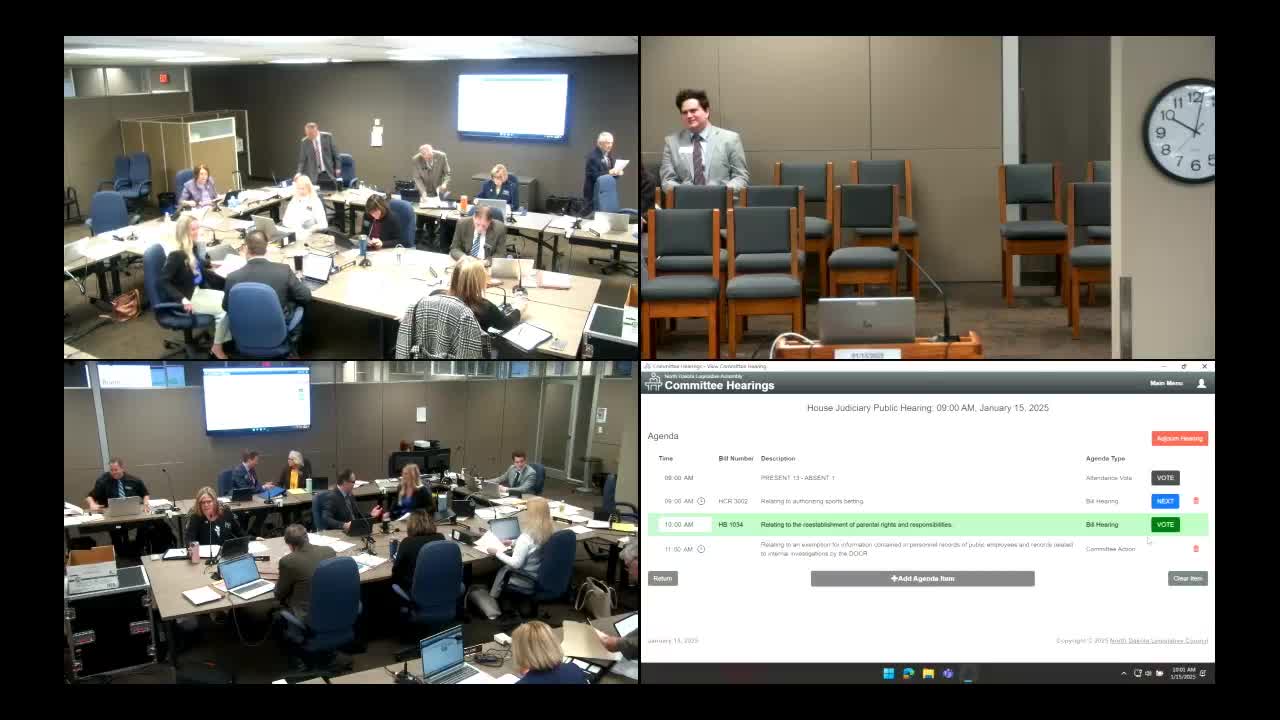Committee hears bill to create court process for reinstating terminated parental rights
Get AI-powered insights, summaries, and transcripts
Subscribe
Summary
The committee heard House Bill 1034, which would create a court process to allow parents whose parental rights were terminated to petition for reinstatement if narrow statutory criteria are met.
The House Judiciary Committee held a hearing on House Bill 1034, which would add a statutory process in Title 27 of the North Dakota Century Code permitting a court to reestablish parental rights that were previously terminated.
Julie Hoffman, adoptions administrator for Children and Family Services at the Department of Health and Human Services, testified in support and described the bill as the product of an interim study ordered in 2023 (House Bill 1091, sec. 20) and a workgroup that reviewed other states’ laws. "The group reviewed information from the National Conference of State Legislatures on reinstatement of parental rights," Hoffman said. She said the work group compared statutes in five states and concluded a narrowly focused reinstatement process could help a small number of children for whom permanency had not been achieved.
Under the draft bill, a petition for reinstatement may be filed by an interested party from the original termination proceeding; the petition may not proceed unless at least 12 months have passed since the final termination order, the child has not been adopted or placed for adoption, the child remains in public foster care, there is no pending appeal from the original termination order, and the genetic parent demonstrates the ability to care for the child. The court would consider the child’s age, maturity and preference, appoint counsel for the child regardless of income, and set a clear‑and‑convincing evidentiary standard for reinstatement. The bill allows a court to order a trial home visit or transitional plan and permits the court, after denial, to bar subsequent petitions in appropriate cases.
Proponents including Travis Fink, executive director of the North Dakota Commission on Legal Counsel for Indigents, said the draft contains multiple safeguards. "We built in a lot of safeguards and I think...the state's attorney in that county receives a copy of any petition," Fink said, adding the prima facie review step prevents spurious filings and that the high evidentiary standard protects children.
Human service zone leaders said the measure could help a limited set of families. Desiree Sorensen, director of the Mountrail‑McKenzie Human Service Zone, told the committee the bill would require additional zone policies and procedures but could be appropriate for rare cases where a parent has remedied the circumstances that led to termination and permanency was otherwise unattainable.
Committee members asked about the 12‑month threshold; Hoffman said the period was debated in the work group and that other proposals ranging from one to five years had been considered. Hoffman provided data: as of January 1, 2025, there were 119 children in foster care with termination orders granted more than one year earlier; 23 of those children were in adoptive placement and six had already been adopted, leaving approximately 90 cases for which current permanency status was unknown. Witnesses and committee members discussed how guardianships and adoptive placements would interact with reinstatement petitions; witnesses said the bill could be amended to clarify effects on guardianships and to spell out timing and procedures for trial home visits and evidentiary hearings.
Supporters urged the committee to advance the bill with opportunities for targeted amendments; no committee vote or final action was recorded in the hearing transcript.
